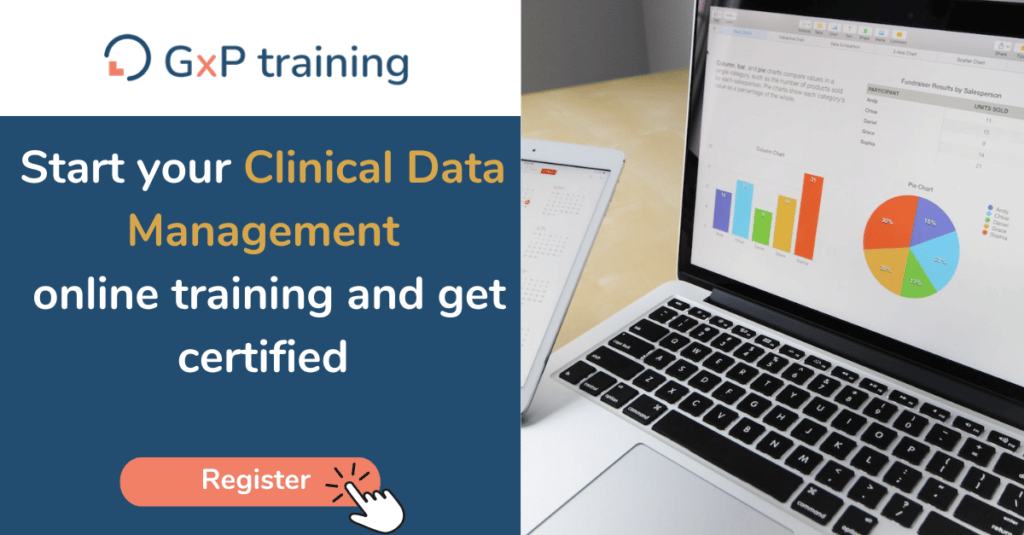The clinical data management training helps you familiarize yourself with the concepts used in clinical research and trials, starting with the technical terms, the various phases of clinical trials, the drug approval processes, and every other aspect of clinical trial management.
Clinical trials are a significant part of the healthcare industry that keeps us moving forward. They help find new treatments and medications for our various healthcare issues. Clinical trials involve a lot of safety-critical procedures, sensitive data, in-depth analysis, and research, which should all be managed ethically and efficiently. Understanding what forms good clinical practice, and enrolling in clinical trial management training, is thus a necessary part of becoming a professional in the healthcare field.
What is a Good Clinical Practice?
GCP, which stands for Good Clinical Practice, is an international quality standard for maintaining ethical conduct and scientific quality for all clinical trials and practice operations. Governments and private agencies often use these standards worldwide to validate the legality and quality of clinical trials. GCP helps regulate the various clinical research processes in the medical field and provides a standardization that allows for efficiency and easy information sharing across the scientific community, regulatory bodies, and the public.
Good Clinical Practice was first formulated in the 1960s after WHO convened a Scientific Group to form the basic principles for evaluating medicines and drug products. GCP guidelines are gathered from existing good practices across the world from the EU, Japan, Canada, and more. These standards were further refined in 1975 when proposals and guidelines for drug research and development were added to GCP regulations. There have been a few more iterations of the GCP, and it is kept updated to reflect the advancements in the medical field.
What Forms a Good Clinical Practice?
GCP is formed to assure the public of the ethicality and quality of drugs, medical products, and the research process behind every medical procedure and drug development.
Everyone involved in drug development is responsible, including sponsors, investigators, the staff, research organizations, ethics committees, research participants and subjects, and regulatory bodies, to ensure the upkeep of GCP.
GCP has some basic principles that trace back to the declaration of Helsinki, which put forth the basic guidelines on ethical medical research conduct. The principles are:
- Ethical conduct
- Detailed protocol for every research involving humans
- Risk identification must be properly conducted and supported by proper non-clinical and clinical data
- Benefit-risk assessment inclusive of the rights and well-being of the research participants and subjects
- A proper review of the research that independent committees and review boards approve
- Compliance with the approved protocol
- All participants must legally authorize and give informed consent
- Continuous improvement and benefit-risk assessment
- Only qualified investigators and staff be involved with the research operations
- All clinical trial data must be managed, tracked, and well accounted for
- The confidentiality and privacy of the subjects must be assured
- Good Manufacturing Practices must be upheld.
- Quality systems must be implemented to manage every aspect of the clinical trial process.
A good grasp of GCP is necessary to qualify for any professional position in the clinical trial process. Several training modules and courses are specifically designed to help professionals and research subjects understand the implications of GCP and how well it can be executed in a clinical trial project.
What is Clinical Data Management?
Clinical data management refers to the overall management of the huge volumes of data involved in clinical trials in accordance with the GCP protocols and principles. It involves designing the necessary management structure, roles, responsibilities, project goals and planning, and all the software systems, processes, and procedures involved. Any professional wanting to work with clinical trials must have a good knowledge of clinical data management systems and should be aptly trained in them.
The clinical data management training helps you familiarize yourself with the concepts used in clinical research and trials, starting with the technical terms, the various phases of clinical trials, the drug approval processes, and every other aspect of clinical trial management. Besides these basics, data management also covers the various access levels, authorization methodologies, data hierarchy, classification, and confidentiality levels.
You will also learn about clinical trial data management software systems, which are essential tools that help store, retrieve and track clinical data.
Clinical Data Management Training
Clinical research data is highly sensitive, and its confidentiality must be maintained throughout the process. You should ensure safe record-keeping and accurate reporting within the GCP’s regulatory compliances. GCP demands proper record-keeping and auditing processes to validate any clinical trial data. These processes follow a proper workflow defined by the GCP standards.
There are various stages of data management throughout the clinical trial process. And the people involved must ensure data integrity and confidentiality are secured at all these stages. From collecting data to summarizing, monitoring, and distributing data to stakeholders, the way data is handled should be as the compliance standards regulate it. People working with data management should be aware of the various data sources, how to store them safely, the various data tools used, the reporting facilities used, and how to safely share data.
Various roles include programmer, investigator, admin, medical coder quality assurance, and more associated with data management. Each of these roles has its responsibilities regarding handling data.
The clinical data management training helps you understand data-related features such as:
- 21 CFR Part 11 compliance
- Document management
- Electronic data capture
- Enrollment management
- HIPAA compliance
- Installation
- Investigator and site profiling
- Monitoring
- User management
- Patient database
- Payment portal
- Pricing
- Recruitment management
- Scheduling
- Study planning and workflow management
- Support
Quality Management Training
Ensuring the high accuracy of clinical trial data is critical to the approval of any findings made by a clinical trial. The major factors that affect the quality of clinical data are:
- Data conventions
- Monitoring guidelines followed by the clinical study
- Care report forms
- Missing data
- Verification of source data
Quality data management training helps you gain deeper insights into taking care of all these factors and ensuring high-quality clinical trial results.
Enroll in a Clinical Data Management Training to Learn More
Clinical data management can be a complex activity. It requires great expertise in the research domain and the GCP protocols. While many one-stop electronic clinical trial management systems are available, you still need to be trained in clinical data management to use these tools effectively. Besides honing up on your GCP knowledge, you should also be well-versed in these CTMS (clinical trial management systems) to work with modern-day clinical data projects. Take up our comprehensive course on everything you need to know about clinical data management. This online clinical data management course has been developed by Dr. Patricia Kay, a senior research data management professional with 20+ years of experience in clinical development, stakeholder management, business unit operations, and personnel management. This 2-hour training course provides you with a certificate of completion and CEU/CPD accreditation.





